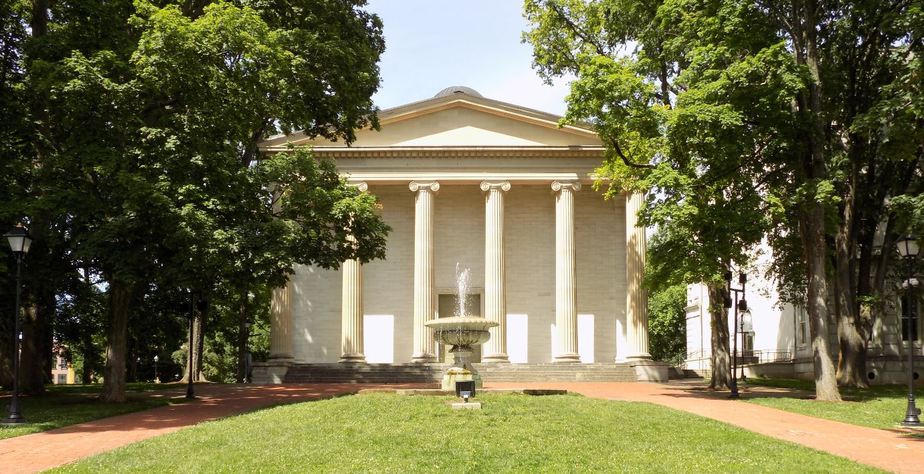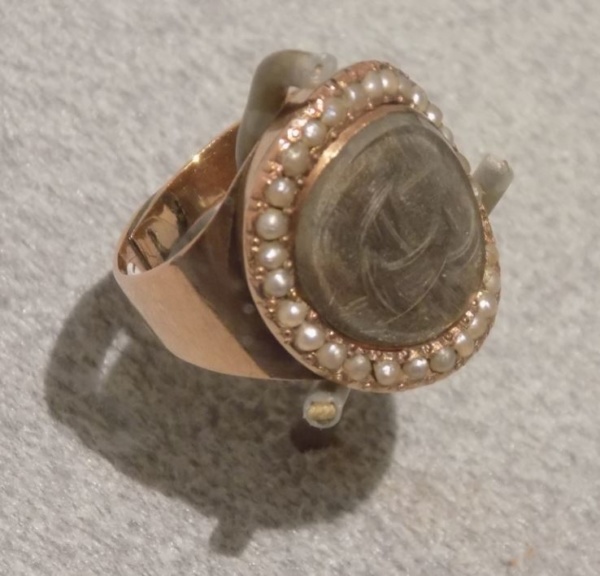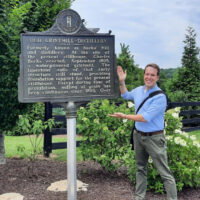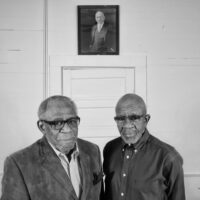At first glance, the ring in the exhibit case appears to be unremarkable.
Made of thin brass, the ring’s crown includes more than two dozen small seed pearls that encircle a plate of beveled glass. Twisted under the glass lies a wisp of brown and gray hair, woven into a minute design reminiscent of a Celtic knot.

But the story it tells is anything but unremarkable. On display in “Dueling Grounds,” — a mini-exhibit about dueling that the Kentucky Historical Society has opened at the Old State Capitol in Frankfort — the ring holds the hair of a man killed in an 1801 duel near Bardstown. It serves as a grim reminder of a time when Kentuckians used formalized violence as a means to settle conflict.
Because duels were illegal, the total number of “affairs of honor” fought in the commonwealth is unknown. However, what is known is that dozens of them took place in Kentucky from 1790 to 1866. In fact, their frequency prompted the commonwealth to require many officials, including lawyers, to swear that they have never dueled as part of their oath of office.
Although arguments or insults typically caused duels, men also fought for stranger reasons.
In 1818, for example, two Lexington doctors, Benjamin Dudley and William Richardson, dueled after an argument about a post-mortem examination. Dudley shot Richardson and then saved his opponent’s life by administering medical aid. In Frankfort a year later, Jacob Holman killed Francis Waring in a duel after Waring slayed Holman’s dog.
The ring in the exhibit—and the clipped hair that it holds—resulted from an argument between two prominent Bardstown residents, Dr. John Chambers and John Rowan.

In January 1801, Chambers and Rowan played cards at a local tavern. Both had been drinking ale, and an argument and fistfight ensued. Chambers, insulted by the affray, challenged Rowan to a duel.
On Feb. 3, the two squared off in the woods about 2 miles south of Bardstown. Both participants were young men, with Chambers being 25 years old and Rowan three years his senior. They fought with single-shot pistols, standing 10 paces apart.
“As agreed upon they fired … ,” witness George M. Bibb wrote, “Mr. Rowan first and then the Doctor. Mr. Rowan rested his pistol on his left hand — the Doctor his on the left arm above the elbow. The deliberate and long aim of each prompted each of their friends to ask, if they were hurt.”
Both duelists missed, so they chose to fire again.
The second shot proved to be deadly. Rowan hit Chambers in the side, under the left arm.
Witnesses rushed in to help. “I saw the wound,” Bibb wrote, “but little blood had issued.” Bibb told Rowan that Chambers would likely die from the injury. “I am sorry,” Rowan said.
Bibb later wrote, “For myself I say they fought bravely and honestly.”
Despite Chambers’ death, the incident did not hinder Rowan’s political career. Three years after the fatal encounter, Rowan became Kentucky’s secretary of state. He was later a U.S. senator and a judge on the state court of appeals. Rowan also served as president of the Kentucky Historical Society.
Rowan’s most lasting achievement, however, is his Bardstown home, “Federal Hill.” Today, thanks to the Stephen Foster song that was supposedly inspired there, it is the state park known as “My Old Kentucky Home.”
According to family tradition, Rowan had the ring — which allegedly contains a lock of Chambers’ hair — crafted as a way to remember the episode. Because he never dueled again, some speculate he made the ring as a reminder to avoid future affairs of honor.
More from Stuart Sanders:
Stuart W. Sanders is the Kentucky Historical Society's Director of Research and Collections. His latest book, “Murder on the Ohio Belle,” examines Southern honor culture, vigilante justice and the Civil War through the lens of an 1856 murder on a steamboat. Find him on Twitter @StuartWSanders.





